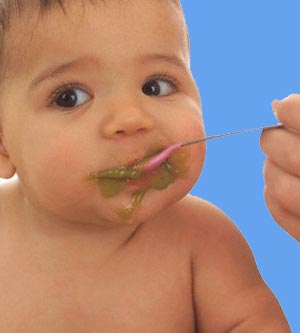Baby Food Tip


Any mother would vouch for the fact that all babies are different and each has his or her own food preferences and tastes. Babies are started on solid foods anytime between 4 and 7 months of age. The readiness of each baby to solid food varies. If the baby can support his own head and seems interested in food, he is most likely to welcome baby food. When choosing and trying out different baby food items, you need to be patient and gradual in your approach.
Never force any baby food on the infant. With the bewildering range of baby foods available in the supermarkets today, parents are confused about choosing the right type of baby food. Read up our baby food tips - vital points that parents need to bear in mind. Find out how you can help chart your baby on to the path of healthy eating.
Baby food tips for meals
You can begin your baby breakfast with oats, preferably unsweetened. The oats can be cooked with water, formula milk or even breast milk. Once the child is comfortable with oats, you can add steamed or mashed fruit. Egg yolks are a nutritious breakfast meal for your infant. Some children are allergic to egg white, so you need to try it out carefully. Soups or broths with soft vegetables or shredded meats or cheese are nutritious for the growing baby.
Baked potatoes mashed with soft vegetables and butter is yet another meal option for a baby starting on solid foods. Pasta or rice can be introduced for babies at meals. Adding cooked vegetables or well-shredded meat alongside can make it a well-balanced meal.
Adding colored fruits and vegetables can add to the nutritional composition as well as appear tempting to the child. Spinach, asparagus, zucchini, tomatoes and peas can be included in the baby food diet. Cereals, cooked noodles, soft breads and rice go down well with most babies.
Baby food tips
- Try out one new baby food at a time. You need to check for any possible allergic reaction. If you have a family history of food allergies, it becomes all the more essential to wait for the baby's digestive system to mature further before tying out new food items. Foods such as milk, eggs, fish, shrimp and peanuts can trigger allergic reactions that can range from mild skin rashes to breathing difficulties.
- Ensure that the baby food diet is a blend of proteins, carbohydrates, fruits and vegetables. You can prepare baby food at home with a food processor or blender.
- If the baby refuses the baby food initially, you should try again a few days later. The baby has to get used to the new taste and texture. Over a period of time, you can increase the thickness of the food and move onto chunkier soft lumps and mashed foods.
- An important baby food tip is to refrain from bribing or rewarding the baby with food. Force-feeding can lead to overeating in later years.
- A vital baby food tip for parents is to avoid giving honey to a child less than a year old. Honey can harbor botulinum spores that can spark off a deadly toxin. Since an infant's digestive system is not acidic enough, the growth of the spore is not contained.
- Thawed baby food must not be refrozen. Unused food must be refrigerated or frozen immediately.
- Baby food must not be overly sweet or salty or spiced. Nuts, popcorn, raisins and peanut butter must be avoided with babies less than 2 years.
Finger foods
Once the child is comfortable with the mashed baby food and is enthusiastic about it, you can introduce finger foods. Sticks of celery and carrot, sandwiches and chopped pieces of potato or meat can make for ideal finger foods. Finger foods can include small pieces of well-cooked meat, small pieces of cheese, and cooked pasta. Ensure that there are no items that the baby can choke on. Finger foods can be the first step towards learning to eat.
Organic baby food
Many parents are resorting to organic baby food for their little ones. Products that are grown sans the potentially harmful effect of pesticides and herbicides are considered more wholesome and nutritious for the babies. Organic baby food allows parents to choose from foods that do not contain the high levels of salt, sugar and coloring that are usual with many baby food products. Organic baby food is more expensive than the regular products.
Top of the Page: Baby Food Tip
Tags:#baby food #choosing baby food #baby food tip #organic baby food
 Parenting
Parenting Stages of Growth
Precocious Puberty
Nutrition for Kids
Developmental Milestone
Empty Nest Syndrome
Infants
Sudden Infant Death Syndrome
Infant Gas Drops
Milk Allergy in Infants
Infant Reflux
Infant Nutrition
Infant Bathing
Infant Toy
Infant Colic
RSV in Infants
Asthma in Infants
Infant Brain Development
Babies
Baby Milestone
Baby Teething
Toddler Food Recipe
Baby Nursery Furniture
Baby Food Tip
Baby Monitor
Baby Burping
Children Care
 Regular Bedtime for Toddlers
Regular Bedtime for Toddlers Child Care
Kid Summer Camp
Kid Gym
Tween Parenting
Benefits of Breastfeeding
Oppositional Defiance Disorder
Attention Deficit Hyperactivity Disorder - ADHD
Kid Homework Help
Fine Motor Skill
Family Parenting
Single Parenting
Specialty Toy
Child Playhouse
Playgroup
Causes of Child Obesity
Autistic Child
Learning Disability
Toddler Activity
Activities for Toddlers
Child Safety Tip
Child Safety on the Net
Allergies in Toddlers
Top of the Page: Baby Food Tip
Popularity Index: 100,900

